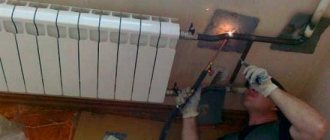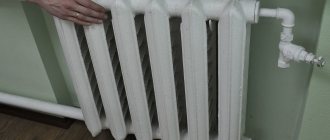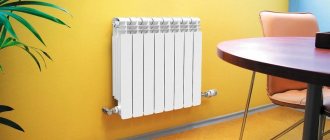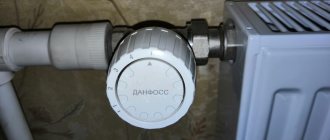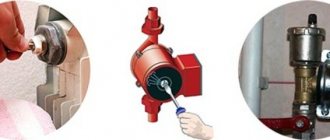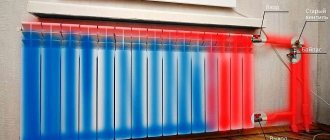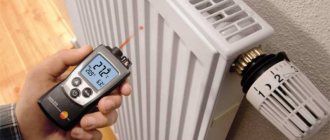The issue of replacing batteries after the start of the heating season sometimes arises very acutely. Radiators in old houses are often in poor condition, and local services are in no hurry to carry out major repairs to the heating system. We will try to give answers to the most common questions and find out who should change old batteries in a privatized apartment.
- If the radiator leaks, who is legally required to replace it? At whose expense is the installation and purchase of new equipment carried out?
- If you want to install a more modern heating system in an apartment after privatization, who should do this? Do I need special permission for this?
- Who is responsible for a leak if the neighbors are flooded with water?
To answer these questions, you need to study Russian legislation and understand the legal aspects.
Heating radiators - public or private property?
It is possible to understand who should be responsible for replacing faulty heating devices in a privatized apartment only by establishing whose ownership they are. By Decree of the Government of the Russian Federation No. 491 in August 2006, rules were adopted regulating the composition of common property in an apartment building. According to paragraph 6 of these rules, such property includes a heating system located inside the house. It includes:
- risers;
- valves (regulating and shut-off);
- heating elements (radiators);
- general house heat energy meters;
- other types of equipment that are part of heating networks.
USEFUL INFORMATION: Types of batteries: choosing a heating radiator for an apartment
Unfortunately, when situations arise regarding the replacement of heating devices in apartments, both parties interpret these rules in their own interests. Homeowners believe that since the heating system belongs to common property, then the replacement of faulty equipment should be handled by the house management organization. Housing office workers, in turn, argue that common property includes only risers and radiators that pass through several residential premises, for example those installed on staircases. When contacting utility services, residents often hear that malfunctions of all pipes and radiators located within their apartment are the problem of its owners.
What to use to seal a leak
Depending on the nature of the damage, a radiator leak can be eliminated in different ways.
All of them are available to the home master:
- restoring the tightness of the system by welding;
- use of a cement-plaster cast;
- wrapping the problem area with FUM tape (fluoroplastic sealing material);
- use of moisture-resistant glue;
- squeezing the fistula with a gasket and a clamp;
- making a cold-welded seal or sealant to eliminate a leak.
With minor damage, it is quite possible to cope with the problem yourself. To do this you will need certain materials, tools and some free time.
Prices for sealant to fix leaks
sealant for sealing leaks
Who is right: the residents or the housing office?
Due to frequent appeals to the court and the Housing and Communal Services Department, in 2007 the Ministry of Regional Development of the Russian Federation clarified the situation and reported that heating elements located in private apartments are part of the common property of the house.
It follows from this that if, due to a high degree of wear and tear or as a result of an accident, the battery leaks, it must be replaced by an organization that receives monthly money from residents in the form of contributions for major repairs and is responsible for the maintenance and servicing of home property.
USEFUL INFORMATION: The heating was on, but the radiators remained cold: what to do
Management organizations are not interested in bringing this information to the attention of apartment owners, so residents are still forced to pay for the dismantling and installation of a new heating device, which, among other things, must be purchased independently.
Who should I complain to about the inaction of utility companies?
It is no secret that employees of DUKs or DEZs do not always respond to residents’ complaints in a timely manner. Meanwhile, their main responsibility is to create a comfortable living environment for residents in the entrusted territory. It is their work that citizens pay for on a monthly basis using housing and communal services receipts. Since utility companies are service providers, Rospotrebnadzor is responsible for monitoring the quality of their provision. The owner of the property also monitors the work of the DUK. If the company does not fulfill its obligations, he has the right to refuse its services.
Source
Repair and replacement of a leaking battery
We found out that the heating system is part of the common property of an apartment building and also includes radiators located in the apartments. It follows from this that, regardless of whether the area is privatized or is municipal property, the management organization, HOA or housing cooperative is obliged to repair or replace the battery, which is in disrepair . In this case, no additional payment is taken from the homeowner.
USEFUL INFORMATION: Flushing radiators: methods and techniques
In other words, if the battery is leaking, you need to call a house service technician, and he will replace the failed heating device free of charge.
In practice, things are not so simple. Housing office workers may claim that they do not have a replacement battery, so they will repair the old one or, even worse, remove the radiator, install plugs and ask you to wait. Since this wait can last for months, the apartment owner is simply forced to buy new equipment on his own, because no one wants to freeze in winter without heating.
There are cases when residents, without waiting for a replacement, purchase a radiator at their own expense and hope that DUK will pay them compensation. You definitely shouldn’t count on this, since even judicial practice says that the house management organization is not obliged to do this.
How to repair a hole in a radiator
In everyday life, situations related to a breakdown of the heating system do not occur so rarely. The methods that have been described will help you not only protect your belongings, but also prevent small things from turning into a disaster. Only emergency service technicians can completely fix a major problem, but it is imperative to reduce the amount of leaking water. I would like to note that the most important thing is to know how to prevent an accident, and not how to eliminate it when the heating season has already begun. For preventive purposes, it is best to flush the heating system every year and conduct hydraulic tests, which will not only help improve the heating of the premises, but will also allow timely detection of weak areas and places where breakthroughs, cracks and fistulas may appear.
If you are faced with the cases described above and you urgently need to resolve a serious accident where hot water leaks under pressure, then you should throw a blanket over the leak and immediately call the emergency services.
Replacement approval
The first thing you need to do to avoid unpleasant consequences in the future is to coordinate your actions.
- When replacing radiators with similar ones, it is enough to simply notify the management organization about the upcoming work.
- When replacing batteries with a different type, which includes the possibility of different configuration and increasing the heating area, you need to contact a specialist to conduct an examination to determine the possibility of installing new batteries. This is necessary because sometimes installing other radiators has a negative impact on the heat balance of the house. The examination is paid and is carried out at the expense of the apartment owner.
- When moving heating equipment, an examination is also required.
Important! Sometimes changing the configuration of heating devices and increasing their number is perceived as re-equipping the premises with amendments to the apartment’s registration certificate. In fact, replacing the battery is not reflected in any way in the technical data sheet, since it only indicates the type of heat source without specifying specific heating devices.
Expert opinion
Anton Tsugunov
Construction expert. Entrepreneur. 17 years of experience. More than 100 completed objects.
The procedure for approving the replacement of heating radiators:
- Contacting the management company (MC, HOA, etc.) with a notification that it is planned to replace the batteries. In response to such an appeal, the management company is obliged to issue technical specifications (TS) with a detailed description of the requirements for radiators and the method of their installation.
- Contact a design organization, which, based on the specifications, will make a design with calculations of the sections of radiators to be installed.
- With the received project, you can contact the management company again. It is necessary to write a free-form application for replacement of batteries, attach to it: documents on ownership of the apartment, a copy of the technical passport for the apartment with a note on the replacement of radiators, a prepared project and a technical passport for the new radiator (if it has already been purchased).
- If it is planned to replace the radiators by a third-party organization (not the management company), then a copy of the registration certificate of this organization in the Unified State Register of Legal Entities, as well as a copy of the certificate of membership in the SRO should also be attached to the application.
- Such an application will be considered within 30 days. After which the management company must issue written approval for the replacement of heating radiators.
- After receiving the approval document, you can schedule the date for replacing the batteries. To do this, you will have to contact the management company again with an application to turn off the risers and water discharge for a specific day of work.
First measures to eliminate emergency situations
If a break in the sewer or water supply or heating pipes does occur in your apartment, you need to take a number of measures to temporarily eliminate the leak before the specialist arrives. Let's look at them.
Installing a rubber tie
Installation of rubber trim
Almost any rubber product is suitable as a tightening, including medical tourniquets, bicycle inner tubes, etc. First, you need to tightly wrap the leak area with this product, then place a metal self-tightening clamp on top of it and tighten it until it clicks.
Installation of self-tapping screw
Note! This method can only be used when repairing new pipes due to the fact that when cutting threads in old pipes, destruction of the metal is possible.
For this method you will need:
- self-tapping screw with press washer,
- drill,
- metal drill,
- nozzle for cutting threads in metal.
In the place where the pipe has burst, you need to drill a hole in the pipe with a drill to the diameter of the self-tapping screw, then, changing the nozzle, cut the thread. After that, screw in the self-tapping screw. This method is good for eliminating water pressure leaks.
Sealing with epoxy glue
Applying adhesive tape
Who should be responsible for replacing heating equipment?
The apartment owner can choose one of three options.
- Independent replacement of radiators (everywhere batteries are changed by hand, but membership in an SRO is required by law).
- Contacting third-party specialists (must be members of the SRO).
- Call a technician from a service organization.
USEFUL INFORMATION: How to install a temperature controller on a battery
Despite the fact that employees of a private company can perform better installation of new equipment, knowledgeable people recommend calling a local specialist. This is so that in case of possible problems in the future, you will know who to contact. If an accident occurs, you will not be held responsible for poor installation of equipment that caused damage to the property of other residents.
Responsibility in an emergency
If a leaking radiator or heating pipe in an apartment floods the residents from below, the authorized organization must be responsible for the consequences if it is determined that the owner is not at fault.
Real proceedings await those who unauthorizedly changed the radiators in their apartment without approval from the relevant organization. Even if the leak was not the fault of the tenant and is not related to the installation of new equipment, utility services can make the apartment owner guilty of what happened.
In addition, even if the installation of new batteries was agreed upon, but was carried out by craftsmen not from the management company, the owner will also have to be responsible for the consequences.
USEFUL INFORMATION: How to turn off the heating radiator in an apartment
Recommendations - where to call if a pipe burst in your apartment
Emergency situations usually arise unexpectedly, so information about where to call if a pipe has burst should be in a visible place: in the apartment or on your mobile phone.
Any person develops an algorithm of actions in critical conditions - he is directed towards a specific goal and consistently achieves it.
The direction is clear: stop the flow, and establishing who is to blame will not be difficult. Emergency phone It is important to know where to call if there is a water leak. The purpose of the phone call is to notify the emergency repair team that an accident has occurred as soon as possible. Such units are organized in all housing management companies and city utilities.
An accident occurs at any time of the day or night, and therefore available for contact
We recommend reading: How the market value of a land plot is determined
Cast iron
Good old cast iron radiators continue to be popular. If such batteries were installed in the house and it was decided to replace them with new devices made of the same material, then you will not have to spend money and time on conducting an examination before installation.
USEFUL INFORMATION: How to select and apply paint to radiators
Advantages of cast iron batteries:
- durability and reliability;
- resistance to corrosion;
- resistance to hydraulic shocks.
Flaws:
- heavy weight;
- limited design.
Prevention and care of radiators in summer
After the completion of the heating season, the pipeline must be tested (pressured) with increased hydraulic pressure. This is done in order to identify weak points and repair areas where ruptures or coolant leaks have occurred. The house main is subject to periodic internal flushing by utility services. Water is supplied to the system along with compressed air under pressure. A temporary break is made on the return line (unwinding of one of the connections) to drain dirty water through a hose or hose.
Dust and dirt accumulate on the outer surface of the batteries and on their ribs, which must be washed off in the summer with a cloth moistened with soapy water. Once warm, the cleaned surfaces can be coated with fresh paint. This will make them dry faster. Make the paint layer thin, otherwise it will crack later.
To avoid damage, do not use the equipment as supports or tie clotheslines to the risers. Read about warm floors on a wooden floor on our website.
Steel
Batteries made of steel can be of two types:
- sectional;
- panel.
Advantages of such radiators:
- long service life;
- ability to withstand high operating pressure - 16 atmospheres.
Flaws:
- low resistance to hydraulic shocks or mechanical stress.
Aluminum
Devices of this type may vary in functionality and form.
Advantages of aluminum batteries:
- variety of product options;
- light weight, allowing installation of radiators alone;
- quick response to changes in coolant temperature.
USEFUL INFORMATION: Is it possible to paint hot radiators during the heating season?
Flaws:
- the need for air removal;
- inadmissibility of contact with other metals due to the threat of destruction due to a chemical reaction.
Bimetallic
The most modern heating devices are bimetallic radiators. On the outside they are made of aluminum, the core is made of high-strength steel.
Advantages of bimetallic systems:
- increased wear resistance;
- chemical stability, allowing the radiator to be connected to copper pipes;
- high level of heat transfer;
- presentable appearance.
Flaws:
- high cost;
- intolerance to frequent draining of water.
